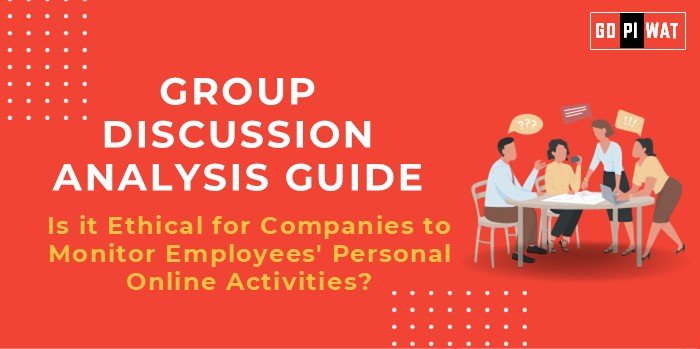📋 Group Discussion Analysis Guide: Is it Ethical for Companies to Monitor Employees’ Personal Online Activities?
🌐 Introduction to the Topic
Opening Context:
“The debate over corporate surveillance versus employee privacy continues to grow in relevance as remote work and digital interactions dominate the modern workplace.”
Topic Background:
Employee monitoring has been practiced in various forms, from physical surveillance to digital tracking, with increasing sophistication. With tools that track online activity, companies claim productivity and security benefits, but critics highlight potential privacy violations and ethical dilemmas.
📊 Quick Facts and Key Statistics
- 📈 Monitoring Software Use: Over 80% of employers use monitoring tools in 2023 (Source: Gartner, 2023).
- 🔍 Employee Awareness: 50% of employees are unaware their activities are monitored (Source: Statista, 2023).
- 💼 Productivity Impact: Companies report a 22% increase in productivity after implementing monitoring software (Source: Forbes, 2022).
- ⚖️ Legal Frameworks: Only 10% of countries have stringent laws regulating workplace surveillance (Source: OECD, 2023).
🧩 Stakeholders and Their Roles
- 🏢 Employers: Seek enhanced productivity, security, and compliance with regulations.
- 👩💼 Employees: Value privacy, autonomy, and trust in their workplace.
- 🏛️ Governments: Regulate to balance business interests with individual rights.
- 🤖 Tech Developers: Innovate tools that enable monitoring while addressing ethical concerns.
- 📢 Civil Rights Groups: Advocate for employee rights and privacy.
🏆 Achievements and Challenges
✨ Achievements:
- ✔️ Improved Productivity: Reduced insider threats and better employee performance through real-time feedback.
- ✔️ Compliance: Enhanced adherence to industry-specific regulations (e.g., financial sector).
⚠️ Challenges:
- ❌ Ethical Concerns: Privacy invasion and lack of informed consent.
- ⚠️ Legal Ambiguities: Different jurisdictions lack uniform policies, leading to misuse.
- ❓ Employee Mistrust: Heavily monitored environments can reduce morale.
🌎 Global Comparisons:
- 🇺🇸 USA: Heavily relies on employer discretion with limited privacy laws.
- 🇪🇺 EU: GDPR ensures stricter employee data protection.
Case Study: In India, IT firms like Infosys have faced criticism for overreaching monitoring policies, sparking internal debates on ethics.
💬 Structured Arguments for Discussion
- Supporting Stance: “Monitoring ensures better compliance and workplace safety, especially in sectors handling sensitive data.”
- Opposing Stance: “Tracking personal activities undermines trust and creates an intrusive work culture.”
- Balanced Perspective: “While monitoring is essential in some contexts, transparency and consent must guide its use.”
📚 Effective Discussion Approaches
Opening Approaches:
- 📊 Data Highlight: “Studies reveal over 50% of employees are unaware they are being monitored…”
- 💭 Contrast Opening: “Can enhancing productivity justify breaching employee privacy?”
Counter-Argument Handling:
- ✔️ “If trust is foundational, how can monitoring co-exist with transparency?”
- ✔️ “Would providing opt-in monitoring options help balance interests?”
📈 Strategic Analysis of Strengths and Weaknesses
- ✔️ Strengths: Improved security, productivity boosts, regulatory compliance.
- ❌ Weaknesses: Eroded trust, potential misuse of data, low morale.
- 💡 Opportunities: Transparency policies, hybrid monitoring approaches.
- ⚠️ Threats: Legal action, public backlash, high attrition rates.
🏫 Connecting with B-School Applications
Real-World Applications:
- 🌟 Policy creation in HR.
- 📚 Regulatory frameworks in operations management.
Sample Interview Questions:
- ❓ “What ethical considerations should guide workplace monitoring policies?”
- ❓ “How can technology balance productivity and privacy?”
Insights for B-School Students:
- 💼 Focus on aligning stakeholder interests.
- 📖 Study global frameworks like GDPR for inspiration.


